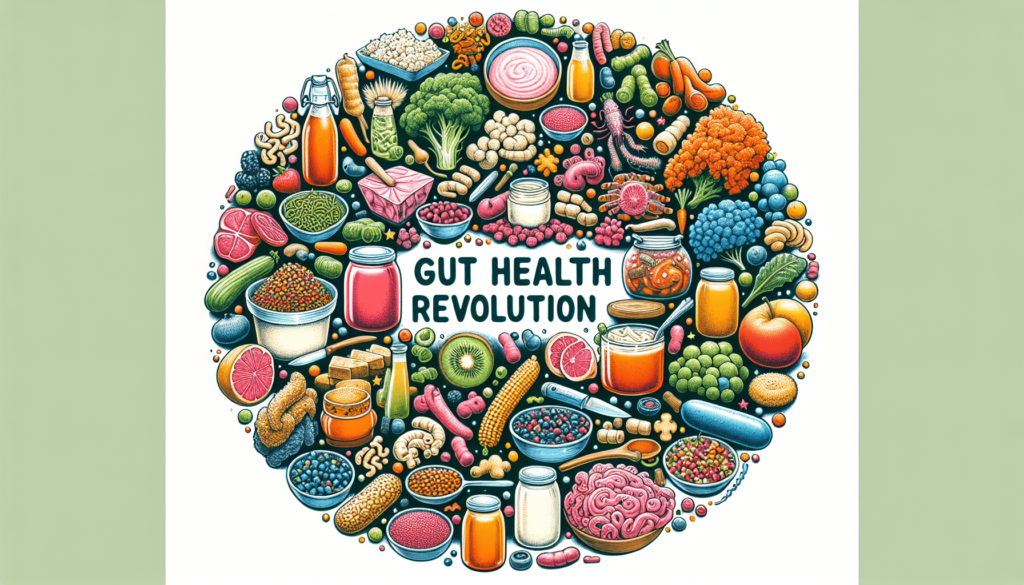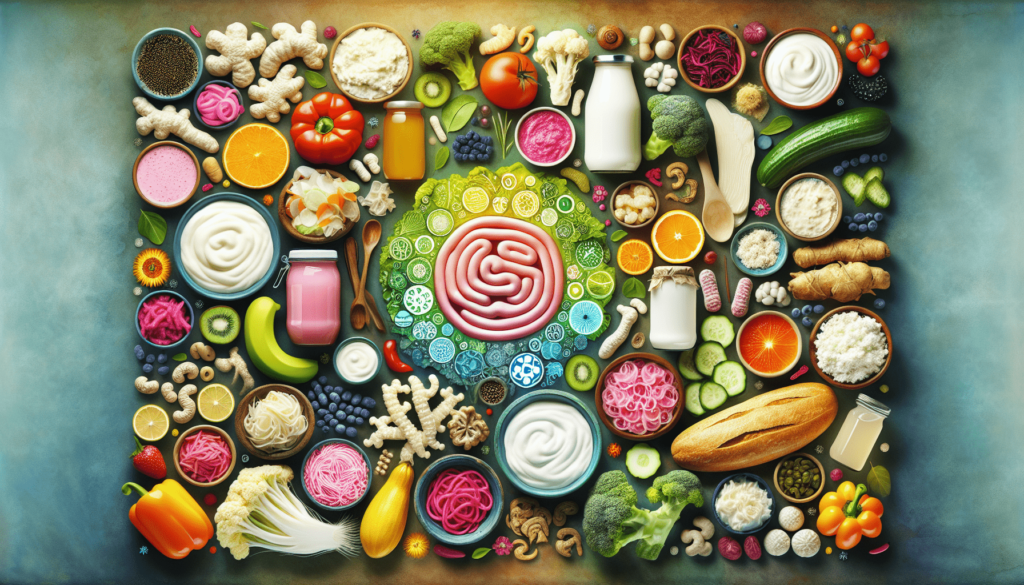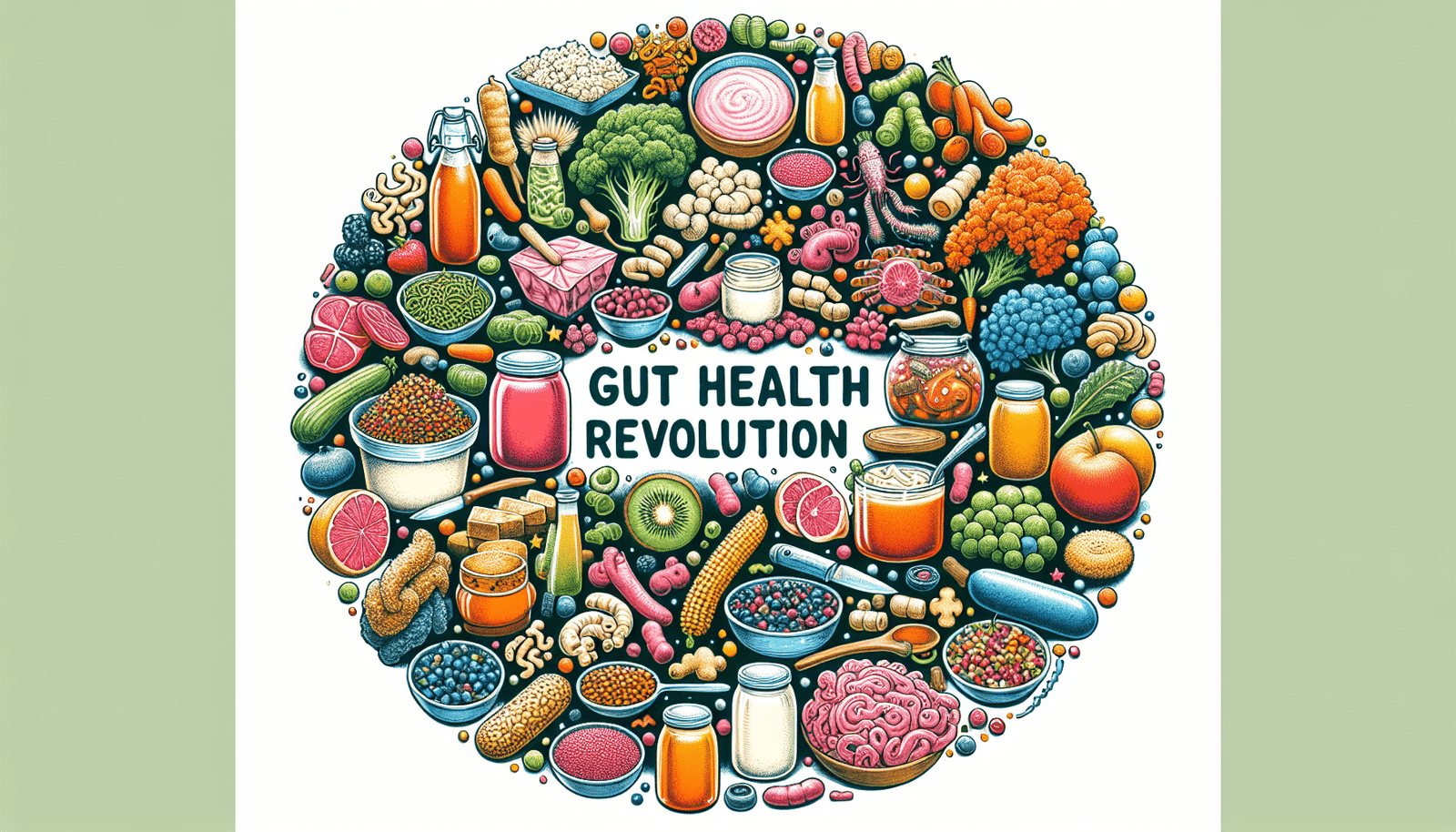Embark on a gut revolution with the ultimate guide to 20 probiotic foods that will unlock the secrets to a thriving microbiome. In the world of vibrant, healthy living, where food is considered medicine and prevention takes center stage, these keywords hold the key to a treasure trove of knowledge. Dive deep into the power of nutrient-rich superfoods, discovering their disease-fighting potential and unraveling the myths surrounding popular detox trends. Empower yourself to make informed food choices that combat heart issues, boost brainpower, aid digestion, and even promote stress reduction and inflammation control. With actionable tips and tantalizing recipes, this journey into the world of healthy foods and disease prevention will pave the way for a future brimming with vitality.
What is the microbiome?
The microbiome refers to the trillions of microorganisms that live in and on your body, particularly in your gut. These microorganisms include bacteria, viruses, fungi, and other microbes. The microbiome is like a bustling ecosystem, with different species interacting with each other and with your body. While some of these microorganisms can cause disease, the majority of them are beneficial and play a crucial role in your overall health.
The microbiome and its importance
Your microbiome is incredibly diverse and constantly changing. It is shaped by factors such as your genetics, diet, lifestyle, environment, and even stress levels. The composition of your microbiome can have a profound impact on your health, affecting everything from your digestion and immune system to your mood and cognitive function.
How the microbiome affects overall health
The bacteria in your gut help break down food that your body can’t digest, produce vitamins, and help protect against harmful pathogens. They also play a vital role in regulating your immune system, keeping it balanced and responsive. In fact, about 70% of your immune system resides in your gut.
Research has also shown that the microbiome plays a role in other aspects of health, such as metabolism, weight management, and even mental health. Imbalances in the microbiome, known as dysbiosis, have been linked to conditions such as obesity, diabetes, autoimmune diseases, and mental health disorders.
The role of probiotics in maintaining a healthy microbiome
Probiotics are live microorganisms that, when consumed in adequate amounts, provide health benefits to the host. They are often referred to as “good bacteria” and can help restore and maintain a healthy balance in the microbiome.
Understanding probiotics
Definition and types of probiotics
Probiotics can be found in various forms, including foods and supplements. They are categorized into different strains, with each strain having specific benefits. The most common types of probiotics include Lactobacillus and Bifidobacterium strains.
How probiotics work in the gut
When you consume probiotics, they pass through your digestive system and reach your gut. Once there, they interact with the existing bacteria in your microbiome. Probiotics can help restore the balance of bacteria in your gut and improve the overall diversity of your microbiome. They also produce substances that can benefit your gut lining and promote overall gut health.
Benefits of probiotics for gut health
Probiotics have been studied extensively for their potential benefits on gut health. They have been shown to help alleviate symptoms of gut disorders such as irritable bowel syndrome (IBS) and inflammatory bowel disease (IBD). Probiotics can also improve digestion, reduce gas and bloating, and promote regular bowel movements. Additionally, they may help strengthen the gut barrier, reducing the likelihood of leaky gut syndrome.

The gut-brain connection
Exploring the link between gut health and mental well-being
It’s not just your gut that benefits from a healthy microbiome; your brain does too. The gut-brain connection refers to the bidirectional communication that occurs between your gut and your brain. Emerging research suggests that the health of your gut microbiome can influence your mood, cognition, and even your risk for mental health disorders such as anxiety and depression.
How a healthy microbiome can impact mood and cognitive function
The bacteria in your gut produce various chemicals, including neurotransmitters like serotonin and dopamine, which are crucial for regulating mood and cognitive function. When your microbiome is imbalanced, it can lead to dysregulation of these neurotransmitters, potentially contributing to mood disorders and cognitive decline.
Probiotic foods that support the gut-brain connection
Certain probiotic foods can support the gut-brain connection and promote mental well-being. Fermented foods like yogurt, sauerkraut, and kimchi contain live bacteria that can populate your gut with beneficial microbes. These probiotic-rich foods have been associated with improved mood and cognitive function in some studies.
Probiotic-rich fermented foods
Yogurt: A classic probiotic food
Yogurt is one of the most well-known probiotic foods. It is made by fermenting milk with specific strains of bacteria, such as Lactobacillus acidophilus and Bifidobacterium lactis. Yogurt is not only a fantastic source of probiotics but also provides essential nutrients like calcium, protein, and vitamins.
Sauerkraut: Packed with beneficial bacteria
Sauerkraut is a fermented cabbage dish that originates from Eastern Europe. It is made by lacto-fermentation, where the natural sugars in cabbage are converted into lactic acid by beneficial bacteria. Sauerkraut is rich in probiotics and can be enjoyed as a side dish or added to sandwiches and salads.
Kombucha: A trendy probiotic beverage
Kombucha is a fermented tea that has gained popularity in recent years. It is brewed by fermenting sweetened tea with a symbiotic culture of bacteria and yeast (SCOBY). The fermentation process produces probiotics, organic acids, and B-vitamins. Kombucha is available in various flavors and can be a refreshing and fizzy probiotic beverage option.
Kimchi: A Korean staple for gut health
Kimchi is a traditional Korean dish made from cabbage, radishes, and other vegetables, all fermented with a variety of spices. It is packed with beneficial bacteria, vitamins, and antioxidants. Kimchi can add a flavorful and probiotic-rich kick to your meals, whether enjoyed as a side dish, added to stir-fries, or used as a topping for rice bowls.
Kefir: A probiotic powerhouse
Kefir is a fermented milk beverage that is similar to yogurt but has a thinner consistency. It is made by fermenting milk with kefir grains, which are a combination of lactic acid bacteria and yeast. Kefir is a potent source of probiotics and is rich in nutrients like calcium and B-vitamins. It can be enjoyed on its own or used in smoothies and salad dressings.

Dairy-free probiotic options
Coconut yogurt: A delicious alternative to dairy
For those who are lactose intolerant or follow a dairy-free diet, coconut yogurt is an excellent probiotic option. It is made from the fermented flesh of coconuts, which provides a creamy and tangy yogurt-like consistency. Coconut yogurt contains live cultures that can support a healthy gut.
Tempeh: A probiotic-rich soy product
Tempeh is a fermented soy product that originated in Indonesia. It is made by fermenting soybeans with a specific type of fungus called Rhizopus oligosporus. Tempeh is not only a great source of plant-based protein but also contains beneficial bacteria. It has a nutty flavor and can be cooked and used in various dishes like stir-fries, salads, and sandwiches.
Miso: A fermented seasoning with probiotic benefits
Miso is a traditional Japanese seasoning made from fermented soybeans, rice, or barley. It is typically used to make miso soup, but it can also be added to marinades, dressings, and other dishes for a savory and umami flavor. Miso contains live enzymes and bacteria that can support a healthy gut.
Pickles: Brimming with probiotics
Pickles are cucumbers that have been soaked in a vinegar or brine solution to preserve them. The pickling process involves fermentation, which creates an environment for probiotic bacteria to thrive. Consuming pickles can introduce beneficial bacteria into your gut and support a healthy microbiome. However, it’s important to choose naturally fermented pickles rather than those made with vinegar, as the latter may not contain live cultures.
Non-dairy sources of probiotics
Sourdough bread: A surprising probiotic source
Sourdough bread is made from fermented dough, which provides a unique tangy flavor and airy texture. The fermentation process involves wild yeasts and lactobacilli, the same beneficial bacteria found in yogurt. While sourdough bread is not as rich in probiotics as other fermented foods, it can still contribute to a healthy gut microbiome.
Olives: A Mediterranean probiotic delight
Olives are a staple in Mediterranean cuisine and offer a host of health benefits. When olives are preserved, they undergo a fermentation process that produces probiotic bacteria. Enjoying olives as a snack, adding them to salads, or using them in cooking can introduce beneficial bacteria into your gut.
Apple cider vinegar: A tangy probiotic option
Apple cider vinegar (ACV) is made from crushed apples that undergo fermentation. ACV contains acetic acid, which can promote the growth of beneficial bacteria in the gut. It is important to choose raw, unfiltered apple cider vinegar, as it contains the “mother,” a cloudy substance that contains probiotics.
Brands of non-dairy probiotic supplements
If you prefer to take probiotic supplements rather than relying solely on food sources, there are various non-dairy options available. These supplements typically contain a blend of beneficial bacteria strains and can be found in capsule, powder, or liquid form. Look for reputable brands that ensure the viability of the bacteria until the expiration date.
Prebiotic foods for a thriving microbiome
Understanding the difference between probiotics and prebiotics
While probiotics are the live bacteria that provide health benefits, prebiotics are the food that these bacteria feed on. Prebiotics are types of dietary fiber that resist digestion in the small intestine and reach the colon, where they promote the growth of beneficial bacteria. Including prebiotic foods in your diet can help support the growth and activity of probiotics in your gut.
Best prebiotic foods to support the growth of beneficial bacteria
Some examples of prebiotic-rich foods include onions, garlic, leeks, asparagus, bananas, oats, and legumes. These foods contain specific types of fiber, such as inulin and fructooligosaccharides, that serve as fuel for the beneficial bacteria in your gut. Including a variety of prebiotic foods in your diet can help nourish and maintain a thriving microbiome.
Incorporating probiotic foods into your diet
Tips for adding probiotics to your meals and snacks
Incorporating probiotics into your diet doesn’t have to be complicated. Start by incorporating small amounts of probiotic-rich foods into your meals and snacks. Add a spoonful of yogurt or kefir to your morning smoothie, top your salads with sauerkraut or kimchi, or enjoy a serving of tempeh in a stir-fry. Experiment with different flavors and combinations to find what you enjoy.
Creative recipes featuring probiotic-rich ingredients
There are countless delicious recipes that can incorporate probiotic-rich ingredients. For example, you can make a yogurt and fruit parfait for breakfast, a tempeh and vegetable stir-fry for lunch, and a miso-glazed salmon with sauerkraut for dinner. Get creative and explore different flavors and textures to make your meals both nutritious and enjoyable.
Probiotics for specific health conditions
Probiotics for digestive disorders such as IBS and Crohn’s
Research has shown that probiotics can be beneficial for individuals with digestive disorders such as irritable bowel syndrome (IBS) and inflammatory bowel disease (IBD). Certain strains of probiotics, such as Bifidobacterium and Lactobacillus, have been found to help reduce symptoms like abdominal pain, bloating, and diarrhea. However, it’s important to work with a healthcare professional to determine the right strains and dosages for your specific condition.
Probiotics for immune system support
A healthy gut microbiome is closely linked to a strong immune system. Probiotic bacteria help regulate and balance the immune response, reducing the risk of infections and allergic reactions. Research suggests that certain probiotic strains, such as Lactobacillus rhamnosus and Bifidobacterium animalis, can enhance immune function and reduce the severity and duration of respiratory infections.
Probiotics for vaginal health
The microbiome of the vaginal area is important for maintaining vaginal health and preventing infections. Lactobacilli are the dominant bacteria in a healthy vaginal microbiome and help maintain an acidic environment that inhibits the growth of harmful bacteria. Certain probiotic strains, such as Lactobacillus crispatus and Lactobacillus reuteri, can help restore and maintain a healthy balance in the vaginal microbiome.
Probiotics for skin health and acne
The impact of the microbiome extends beyond the gut, and it has been found to play a role in skin health as well. Certain strains of probiotics can help reduce inflammation, support wound healing, and prevent acne breakouts. Lactobacillus and Bifidobacterium strains have shown promise in promoting healthy skin and reducing the severity of conditions like acne and eczema.
Choosing the right probiotic foods and supplements
Factors to consider when selecting probiotic products
When selecting probiotic foods or supplements, it’s important to consider several factors. Look for products that contain the specific strains of bacteria that have been studied for their health benefits. Check the labels to ensure that the products contain an adequate number of live bacteria, typically measured in colony-forming units (CFUs). It’s also important to choose products that have been properly stored and handled to ensure the viability of the bacteria.
Dosage and frequency recommendations
The dosage and frequency of probiotic consumption can vary depending on the specific strains and the health condition being targeted. It’s best to follow the recommendations provided on the product labels or consult with a healthcare professional for personalized advice. In general, it’s recommended to start with a low dose and gradually increase if needed.
Potential side effects and precautions
While probiotics are generally safe for most people, they can cause side effects in some individuals. Common side effects include bloating, gas, and mild digestive discomfort, which usually resolve on their own. If you have a compromised immune system or are critically ill, it’s important to consult with a healthcare professional before starting probiotic supplementation, as certain strains may not be suitable for your condition.
Incorporating probiotic-rich foods and supplements into your diet can have a positive impact on your overall health. Whether you’re looking to support your gut health, enhance your immune system, or improve your mental well-being, there are various options available. Start by experimenting with different probiotic foods and find what works best for you. Remember to listen to your body and consult with a healthcare professional if you have any specific health concerns. With the right knowledge and choices, you can nurture a thriving microbiome and unlock a world of vitality and well-being.

